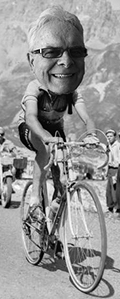Do cyclists need friends like this?
 Mon, August 31, 2009
Mon, August 31, 2009 
Prof. John Pucher(Above.) is an urban planner at the Bloustein School of Planning and Public Policy, in New Brunswick, New Jersey.
The professor puts out many articles, reports and studies on urban planning in the US, and how the lot in life for cyclists and pedestrians could be improved in American cities.
His plans call for cities with separate bike and pedestrian paths, and he uses as a model, cities in Germany and Holland. He points out that these two countries have far more cyclists and pedestrians, but fewer deaths and injury for the group.
It would appear that Prof. Pucher is the cyclist’s friend. However, the problem I have with the bold professor is that he uses scare tactics in order to push his own agenda. This is not the first time I have called him out for this, I did so in May last year.
He publishes articles and reports that exaggerate the dangers of cycling, and indeed walking in America, in order to push forward his plans to separate cyclists and pedestrians from motor vehicle traffic.
Because he is an “Expert” in his field, his reports get picked up by mainstream media, who then write articles implying that cycling is dangerous, and suggesting maybe cyclists shouldn’t be on the road.
Articles like this one in the New York Times, and this one from the Christian Science Monitor.
In Prof. Pucher’s report, at the bottom of Page 10, he states that per kilometer traveled, pedestrians in the American cities were 23 times more likely to be killed than in a car. Again based on kilometers traveled, cyclists in the US were 12 times more likely to die than a motorist.
As I pointed out in this previous article, you cannot compare injury and fatality rates based on distance traveled, be they kilometers or miles. Cars travel far greater distances than bicycles or pedestrians. The statistic is so flawed it should be ignored entirely.
The professor’s figures seem awfully high when compared to others I have seen, but whatever figures you use, those based on distance are false.
It is not unreasonable for someone to drive 30 miles to work, whereas a for bicycle commuter 6 miles would be reasonable, and a pedestrian 3 miles. This reduces the risk factor for a bicycle by 5 times, and the pedestrian rate by 10 times.
Also, you can’t compare cycling in Germany or Holland with cycling in American cities. These European countries have always had a cycling culture. People there have grown up riding bicycles, and are used to sharing the road with bicycles.
These countries are about the size of a single state in the US; they were built in the Middle Ages and designed around horse drawn transport. They have been forced to adopt a cycling culture because there is less space to drive, let alone park a car.
A few more bike paths and bike lanes would be nice in our cities, and I am all for Prof. Pucher pushing that aspect. But ultimately three things are going make cycling in the US safer; that is education, education, education.
Education for drivers, education for cyclists. TV ads, billboards, etc. would be money well spent. More cyclists on the road will make it safer, we become more visible, and of course more people on bikes, means less people in cars.
There are approximately 700 cyclists die in the US each year; and that’s 700 too many. However, let’s get that figure in perspective. With a population of over 300 million in the US, this number is quite small. It is less than 2 cyclists a day out of tens of thousands who take to the streets on their bike every day; quite a tiny risk I would say.
Cycling is not as dangerous as some would lead us to believe, especially when you consider the alternative of living a sedentary lifestyle and all the adverse health issues that entails.
I am all for separating bikes and cars on busy thoroughfares if at all possible, but at some point cars and bikes have to come together. Most people manage to make their daily commute in their car without running into other cars, how difficult is it NOT to run into someone on a bicycle?
And so Prof. Pucher, while I applaud your efforts to improve cycling in our cities; if you are a true friend of cycling, knock it off with the scare tactics.
You give fuel for the anti-cycling, “Get them off the road” faction, and you scare people away from riding a bike, at a time when we should be encouraging more bicycle riding.
What are your views? Am I being overly critical of Prof. Pucher? What do you think is needed to improve cycling and cycling safety?
 Dave Moulton | Comments Off |
Dave Moulton | Comments Off | 

















Reader Comments (15)
+1
I totally agree.
I agree as well. Plus those 3 priorities, education, education, and education are the solution for a number of other problems such as obesity and lack of voter participation. I could go on and on.
I think it would be great if Prof. Pucher were willing to dialog with you about this issue.
I have read some of his articles, unfortunately fear mongering quite often is the only way to get a point across in the US culture. If we really wanted results we would fear monger how dangerous cars are, 41,000 deaths every year with 2.9 million injuries with a cost to society of over $230billion usd.
The euro style infrastructure in it's entirety would not work here in the US, but that doesn't mean we cannot learn from it and adapt portions of it to fit the US infrastructure.
He does need to change from kilometres/miles traveled to a time based comparison.
Aaron
Dr. Pucher is not our friend.
"700 cyclists die in the US each year," is a bogus statistic and so are the statistics for pedestrian deaths. Most of these deaths are motor vehicle deaths. Someone driving a car runs over a cyclist or a pedestrian and this is called a bicycle fatality or a pedestrian fatality! How warped is that? Even dyed in the wool cyclists fall for it.
The automobile is the problem -- and our society's sick relationship with it. Much lower speed limits, very strict enforcement of traffic laws, and restrictions on how and where automobiles can be used would do more than all the bike lanes and multi-use paths we could hope to build; and we would save lives and misery for automobile drivers as well.
Can't we stop ignoring the five hundred pound gorilla and say, "Look, look, it's the cars and the way we use them that are the problem. Stop pointing at us. We're people." When will we wake up and make the automobile our servant instead of our lord?
Charles Lathe
Franklinville, NC
Too many experts and planners, too many automobiles with too little restrictions on their use. Cars are murderous appliances for both their occupants and innocent bystanders. They kill on contact, and they kill remotely in both time and distance.
Nothing will change now, or in the foreseeable future, because people are happy with their pointless little lives of never-ending automated locomotion between suburban house and mall, with the rest of the time filled in by watching reality TV and opinion-shaping shows masquerading as news.
Even the European cycling examples present a false picture, because they focus on very limited inner urban life that no longer represents how the majority of people in those countries are living. It's easy for bloggers to post idyllic pictures of slow cycling in a few select European cities, but outside of those very limited areas, it's a total fantasy. Nobody is posting pictures of the cars at the suburban malls there. It's as if we assumed that everyone in America lives like people on Seinfeld did.
We can see that we're not really getting anyplace when you look at public responses to energy crises and financial meltdowns. Never has the old adage about having only a hammer turning every problem into a nail been more true. Don't change our bad automotive and urban planning habits. Instead, spend billions on changing from one kind of fuel to another, as if electricity didn't have to be produced from something.
I don't need special lanes. Just slow the traffic down to a more reasonable pace, enforce it, and I'll be happy riding as a vehicle just about anywhere.
Hi, Dave;
It's an interesting question. I don't think distance-based comparisons are misleading -- that seems like the most natural way to compare driving vs. cycling. If you live 5 miles from your job, you will decide either to ride there or drive, and your risk factors have to be calculated accordingly.
That said, when I had a car, I drove about 4500 miles a year (on the low end for Americans, I guess). When I got rid of my car and started riding everywhere I go, my mileage definitely dropped -- I would estimate I ride about 2000-3000 miles a year now. So, that "lifestyle change" did have the effect of lowering my annual distance, but not by five times -- perhaps by half.
I think it depends how the question is stated. If we ask "Am I in more danger if I get rid of my car and ride everywhere?" the answer may be different than if we ask "Is it more dangerous to ride to the store or drive there?"
Dave,
We'll try to get a little objective. Academics are simply astute observers with a plan to better things, rather than creating havoc, scare tactics and what not. Think of the time back when you were in school and asked to write an essay on a topic. Your first paragraph would likely be an introduction to the "problem" before you went about describing it and taking your stance. What is the problem here in this case? Its that bicycling is dangerous in the U.S environment. You must be (I don't know for sure) living comfortably in a rural setting where getting out to some country roads is 5 minutes away and a walk in the park. Urban cyclists in this country are literally playing with danger and death. I've visited NYC numerous times and if there was a way to capture these images of cyclists on the road, I would... Studies have been done in colleges there that show not only the growth of cycling in NYC, but absolute brazen behavior from cyclists themselves with others who share the road. So while cars definitely are a danger IF used improperly, a bicycle can also cause injury to a walker if ridden madly.
One prominent academic I talked to in the past, Dr. Wilson (author of Bicycling Science) himself was an avid bicyclist back in the days and firmly believed in the fact that bicycling at the time was dangerous in the U.S. He felt the least bike manufacturers could do was to improve the safety of bicycles, in things such as brakes and tires. He submitted numerous proposals to bike manufacturers on how they could improve their ill-designs. What he often got back was indifference. Am I surprised. No.
Cheers.
Dave:
Very good Post on this issue. It's articles like yours that is needed so much for all. Education, Laws, and just good communication is how this issue will grow to the forefront. We are a nation of motion. We drive, walk, jog, ride, we do it all. I someday see riding bikes (all kinds) becoming a national pastime. Keep up the great work. I enjoy your posts!
Ward Irvin, The Senior Cyclist
I agree about the negative impact of scare tactics. The last thing cyclists need is for more people to think they are ignoring their personal safety and creating a problem by simply being on the road. As another commenter mentions, many (most?) of the fatalities are caused by cars, not cyclists, and Dr. Pucher's data does not address this.
A more meaningful statistic would be accident rate as a function of TIME IN/ON VEHICLE. This is similar to what you propose in your post, and would be easy to calculate by simply taking Dr. Pucher's data and normalizing using the vehicle's average speed.
We're ill-served by cooked statistics, Dave, and when they're used to set public policy, we're being duped. Taxpayers money - our money - goes to solve problems that are often little more than hyperbole. But digging out the truth is hard. It means reading those dry, boring reports and attending dry, boring meetings. Juicy, blood-drenched propaganda is far easier to publish, and far more difficult and time-consuming to refute.
Do you commute to work everyday in city traffic? If not, try it out.
Yikes, Canadian politician knowingly collided with a cyclist.
http://www.nytimes.com/2009/09/02/world/americas/02toronto.html?_r=1&hp
Education, Patience and Debate is needed.
I'm with you on this. I work all season to get in as many miles on the bike as one open freeway drive to visit relatives in another city and back. And those are freeway miles with no intersections, shoppers, texters or other obstructions, just open highway with like-minded travelers.
Even the alarming statistic of 700 killed cyclists isn't much if you think about it for even a moment. And riding a bike isn't what killed them, it was another car. If Ken Kifer had been driving a car the a-hole who took him out might have killed him anyway. Let's not even get into how many of those dead cyclists were DUI bikers continuing the same drunken vehicular behavior that got their license pulled and meeting karma in the form of a current drunk driver.
I don't feel at that great a risk on the roads. Hour for hour in the saddle or in a car, well, I've never been in a serious bike wreck.
Where I live, this summer, either we have had a big increase in car/cyclist collisions, or else they are being reported more. It has definitely painted cycling as a very dangerous activity in the public mind. The standard reaction is always the same: build more bike paths and lanes... by folks who are more occasional people on bikes and summer commuters than they are experienced cyclists.
Like I said before, the car is the problem. There are too many of them, and people drive too fast and too carelessly. That's what we need to work on, not build a bunch of segregated bike roadways for the ill-informed and ill-trained bicycle riders. In my experience, no matter how you designate them, they inevitably end up being poorly-maintained multi-use paths and lanes anyway.
Patience is needed before criticizing. I dont think Pucher meant cycling in as itself is dangerous. It is dangerous when you do it in an environment that does not support cyclists. Then you're simply competing for space with the status quo that often leads to disastrous consequences. Cyclists and motorists as well as public servants are to blame here.